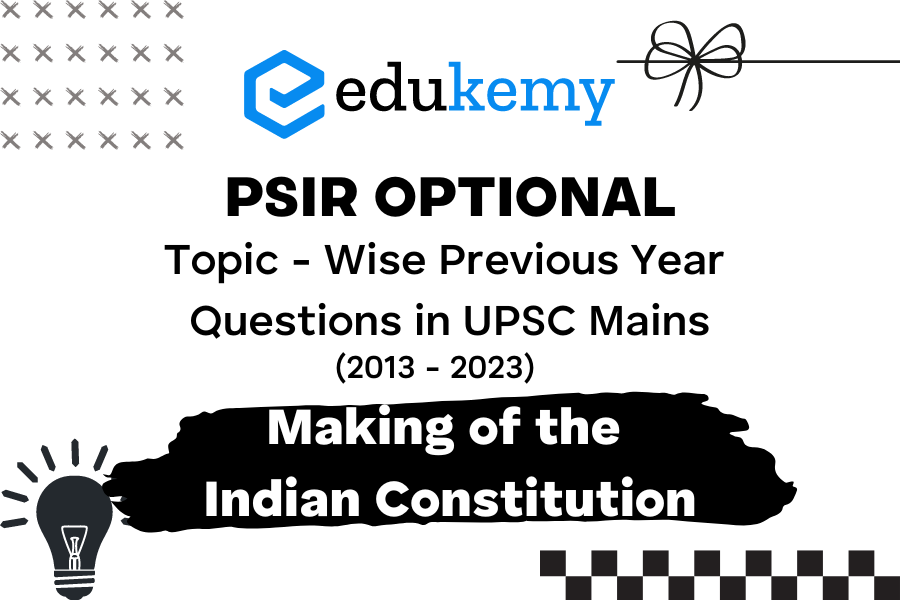
Embarking on the challenging journey of UPSC preparation requires a strategic approach, especially when it comes to optional subjects like Political Science and International Relations (PSIR). One of the crucial components of this optional paper is the section dedicated to the “Making of the Indian Constitution.” Aspiring civil servants often find themselves grappling with the intricacies of this historical and constitutional theme. To provide a valuable resource for UPSC aspirants, this blog delves into a comprehensive analysis of PSIR optional topic-wise previous year questions in UPSC Mains, focusing specifically on the “Making of the Indian Constitution” from the years 2013 to 2023. By meticulously examining these questions, we aim to unravel the underlying patterns, key concepts, and evolving trends that can guide aspirants in their preparation for this significant aspect of the PSIR syllabus.
The “Making of the Indian Constitution” is a foundational topic that not only tests candidates’ knowledge of historical events but also demands a nuanced understanding of the constitutional philosophy that shaped the nation. Through an exploration of the questions posed by the UPSC over the past decade, this blog seeks to illuminate the essential themes, critical perspectives, and relevant dimensions associated with this PSIR optional topic. Whether you’re a seasoned aspirant seeking to refine your preparation strategy or a newcomer navigating the vast landscape of UPSC syllabus, this exploration of previous year questions serves as a valuable compass, guiding you towards a more insightful and effective approach to mastering the intricacies of the “Making of the Indian Constitution” in the PSIR optional paper.
Contents
- 1 Making of the Indian Constitution – Previous Year Questions (UPSC CSE Mains PSIR Optional)
- 2 Frequently Asked Questions (FAQs)
- 2.1 Q: What is the significance of studying the “Making of the Indian Constitution” for UPSC aspirants?
- 2.2 Q: How can previous year questions on the “Making of the Indian Constitution” aid in UPSC preparation?
- 2.3 Q: What are the key dimensions and sub-topics associated with this PSIR optional topic?
- 2.4 Q: How can aspirants effectively balance historical facts and conceptual understanding in their preparation?
- 2.5 Q: Are there any recent trends in the types of questions asked on this topic in the UPSC Mains examination?
- 3 In case you still have your doubts, contact us on 9811333901.
Making of the Indian Constitution – Previous Year Questions (UPSC CSE Mains PSIR Optional)
1. “The origins of the Indian political system are rooted in the history of British India.” Comment. (1997)
2. Comment: Influence of Gandhi, Nehru and Ambedkar in the framing of the Indian Constitution. (1999)
3. Critically examine the impact of the national movement on the making of the constitution of India. (2001)
4. Discuss the dominant external and internal influences in the framing of the Indian Constitution. (2008)
5. Critically examine and comment: “The Constituent Assembly was a one-party body in an essentially one-party country. The Assembly was the Congress and the Congress was India.” (Granville Austin) (2010)
6. Unity and integrity of India was perhaps the single uppermost factor in the minds of the Constitution makers. Comment. (2019)
7. Answer in 150 words: Indian Constitution makers’ concerns on social inequality. (2020)
8. “The Constitution of India is a product of a historical process, rich with constitutional antecedents.” Comment. (150 words) (2021)
9. “The Constitution makers faced the great task of forging a common national identity in the face of unparalleled social and cultural diversity in India.” Comment. (150 words) (2021)
Frequently Asked Questions (FAQs)
Q: What is the significance of studying the “Making of the Indian Constitution” for UPSC aspirants?
Understanding the historical context and constitutional philosophy behind the making of the Indian Constitution is crucial for aspirants aiming to excel in the UPSC examination. This topic not only forms a substantial part of the PSIR optional paper but also provides insights into the foundational principles that govern the world’s largest democracy.
Q: How can previous year questions on the “Making of the Indian Constitution” aid in UPSC preparation?
Analyzing previous year questions helps aspirants identify recurring themes, important sub-topics, and the evolving nature of questions asked by the UPSC. This insight is invaluable for tailoring a targeted study strategy, focusing on key areas that have historically held significance in the examination.
Q: What are the key dimensions and sub-topics associated with this PSIR optional topic?
The “Making of the Indian Constitution” encompasses various dimensions, including the constituent assembly debates, influences from global constitutional frameworks, socio-political contexts, and the role of key architects like Dr. B.R. Ambedkar. Aspirants should delve into these sub-topics to gain a holistic understanding of this pivotal period in Indian history.
Q: How can aspirants effectively balance historical facts and conceptual understanding in their preparation?
While memorizing historical facts is essential, aspirants should also focus on developing a conceptual understanding of the constitutional principles and philosophies that emerged during the making of the Indian Constitution. Balancing these aspects ensures a well-rounded and analytical approach to answering questions in the UPSC Mains examination.
Q: Are there any recent trends in the types of questions asked on this topic in the UPSC Mains examination?
The nature of questions in UPSC examinations evolves over time. Analyzing recent trends in questions related to the “Making of the Indian Constitution” can provide aspirants with a forward-looking perspective, helping them anticipate potential areas of focus and tailor their preparation accordingly.
In case you still have your doubts, contact us on 9811333901.
For UPSC Prelims Resources, Click here
For Daily Updates and Study Material:
Join our Telegram Channel – Edukemy for IAS
- 1. Learn through Videos – here
- 2. Be Exam Ready by Practicing Daily MCQs – here
- 3. Daily Newsletter – Get all your Current Affairs Covered – here
- 4. Mains Answer Writing Practice – here

